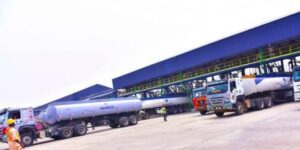
Nigeria to boost oil production to 1.7mbpd
By Akinyemi Precious
Nigeria, OPEC’s largest producer in Africa, aims to significantly increase its oil production to up to 1.7 million barrels per day (bpd) by November 2023, hoping to win a higher quota in the OPEC+ agreement.
Permanent Secretary at Nigeria’s Ministry of Petroleum Resources, Gabriel Tanimu Aduda, made known the sidelines of the OPEC+ seminar in Vienna this week.
Nigeria’s quota was 1.742 million bpd earlier this year, but due to its underproduction of more than 400,000 bpd, the output cap for Nigeria was lowered to 1.38 million bpd at the OPEC+ meeting in early June.
Nigeria has consistently failed to produce to its quota in the OPEC+ agreement. The combination of pipeline vandalism and oil theft with a lack of investment in capacity has made Nigeria the biggest laggard in crude oil production in the OPEC+ alliance.
Oil theft and pipeline vandalism have long plagued Nigeria’s upstream oil and gas industry, driving majors out of the country and often resulting in force majeure at the key crude oil export terminals.
The required production level for Nigeria may be updated to equal the average production that can be achieved in 2024, as assessed by the three independent sources (IHS, Wood Mackenzie, and Rystad Energy) specialised in oil upstream by the next OPEC+ meeting to be held by the end of 2023, OPEC said.
Nigeria’s stated Production Plan in 2024 is 1.578 million bpd, subject to verification, and if verified, then the number will be reflected as required production for 2024, OPEC added.
Nigeria’s oil production is around 1 million bpd below its capacity. The government has cited a lack of investments, a shortage of funding sources because of the energy transition, and insecurity among the factors driving the situation.
The Nigerian Content Development and Monitoring Board (NCDMB) has reiterated its commitment to ensure full implementation of the Nigerian Oil and Gas Industry Content Development (NOGICD) Act 2010.
The Executive Secretary of the Board, Mr Simbi Wabote, said this at the 2023 Nigerial Oil and Gas (NOG) Energy Week on Monday in Abuja.
Reports that the conference was themed: “Nigerian Content Role in Achieving Energy Security.”
Wabote said the implementation of the Act would help to drive development and utilisation of in-country capacities.
He said the NOG conference would continue to serve as an excellent platform to provide clarity, expositions, tips, and guidance to industry practitioners on the provisions of the NOGICD Act (2010).
He said it aimed to provide ministerial regulations, guidelines, tools and initiatives such as the Nigerian Content Equipment Certificate (NCEC), the Nigerian Content Intervention Funds (NCIFund) and Expatriate Quota, among others.
“We believe this will provide a good basis to facilitate the understanding of one of the key enactments guiding the oil and gas industry in Nigeria.
“We have selected three processes and initiatives for a deep dive during the panel sessions which are the NCEC, the NCIFund, and the HCD Guidelines.
“We aim to provide you the information needed on these selected topics, get feedback on faced challenges, and provide guidance on steps to resolve the challenges free of charge,” he said.
The Executive Secretary also dwelt on the functions of the Board as stipulated in Section 70 of the NOGICD Act.
This, he said, would serve as a refresher for some of the participants while also providing clarity on misconceptions about some of the board’s interventions.
Wabote said the board had embarked on several initiatives to assist local contractors and Nigeria companies to develop their capabilities and capacity.
“This will ensure further attainment of the goal of developing Nigerian content in the oil and gas industry.
“The board has been able to implement all these projects because of prudent management,” he said.


